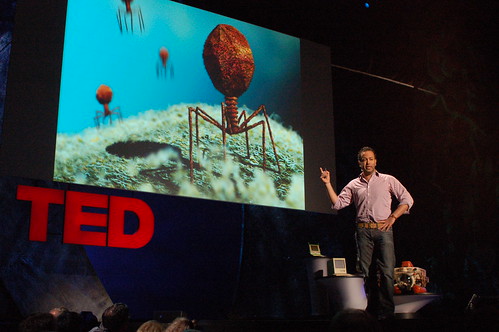[Read Ethan’s blog for liveblogging of TED 2009, and check out the “TED2009” tag on Flickr for images.]
I’ve spent most of the day inside the main theatre at TED. It’s been great getting up close to the speakers and performers, watching them go through their paces, putting on amazing performances. Here are a few of my personal favorites:
Jennifer Mather asks whether octopuses have intelligence. If they have personalities, play and can problem solve, then they have the characteristics that pass a rudimentary intelligence test.
Nalini Nadkarni tells us how she’s trying to get a new generation to think about trees, especially the upper level canopy, and how she thinks “Treetop Barbie” can help.
Bonnie Bassler gave us a story of light emitting bacteria that live within a certain type of shallow-water squid off the coast of Hawaii. How this squid uses a shutter to let out certain amounts of light beneath its body so that it mimics the sky above. It is the “stealth bomber of the ocean”.
Nathan Wolfe blew my mind with his talk on viruses, especially when he started describing his research and travel into central Africa (Cameroon), to study bush meat hunting of primates. It really challenged me to think about local communities in Africa and their needs, and I’m thinking hard on what would it really take to replace this type of activity. Read Ethan’s blog for a full rendition of his talk, but please, join me in thinking about this.
Evan Williams of Twitter was on stage for a few minutes, telling about how he didn’t realize how useful Twitter would be, especially in real-time events. He stated, “It seems that when you give people easy tools to communicate, that good things happen.”
Dickson Despommier, shared some incredible slides describing the need for vertical farming. The advantages include:
- No agricultural runoff
- Year-round crop production
- No crop loss due to severe weather
- Uses 70% less water than outdoors
- Restoration of damaged ecosystems
Willie Smits has lived in Borneo for 30 years, and he set out to save orangutans. He tells everyone of how he has 1000 baby orangutans saved, but shushes everyone’s applause, claiming that this is a failure by all of us because they are not growing up in the wild. Over the last years he has been reclaiming burnt out/used land in Borneo, working with the local communities to make it happen. My favorite quote of his, “Ensure that the local people benefit most.“


February 7, 2009 at 5:28 am
I’ve been so confused by animal rights activists. One one hand they are hardcore about leaving wild animals alone in nature. They are against domesticating wild animals and many times, against all domestication. They would even say that life in captivity is worse than death. All this, and yet they continue to spend TONS of money & resources on animal orphanages. I read stories of organizations pleading for huge amounts of money to save one African elephant or cat (with no intention of using the animal for research, reintroduction to the wild, breading, etc.) just to save it’s life and spend it’s days in captivity. It just doesn’t make sense to me.
As someone so close to working to improve the human condition (on earth and eternally), it’s saddening to me to see so much money, time & resources to go to saving the lives of individual animals. I’m all for conservation, but treating the life of an animal on the same level as a human… it just saddens me.
Are these kind of topics ever discussed at a place like TED? I assume there may be some reluctance due to the fact that it might offend those not working directly on the human condition. But I’m wondering if these conversations ever happen openly?
February 7, 2009 at 8:38 pm
I taught Willie’s son 9th grad English when I lived in Indonesia. I had no idea he was presenting his work at TED. Thanks for the heads-up.
February 8, 2009 at 1:43 pm
Excellent coverage Erik. Absolutely love TED and youre luckier than ever to be interacting with these ideas and people at such close range! Lets hope a world of bio-mimicry, smart, electric grids, and a closer relationship between food and planet is percolating.
Anay (from USAID’s mobile competition)
February 9, 2009 at 4:31 am
Thanks for the constant tweeting and blogging from TED, Erik. Felt much closer to the action. =)
I was really interested in the primate/bush meat discussion, and your “call to action” (if that’s what it was) spurred me into action. I finished a blog post I’d started ages ago on it. As you’re probably aware, it’s a complex issue that needs tackling on multiple layers, driven by economics and human survival. Although, after my year in Nigeria (which I talk about in the post), I didn’t really have any answers, I did come to a number of conclusions, and was surprised by a lot of what I saw. Feel free to check these out at:
http://www.kiwanja.net/blog/2009/02/walking-with-primates/
Always happier to have wider discussions on this, a subject I’m fiercely passionate about.
Ken